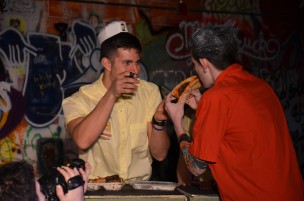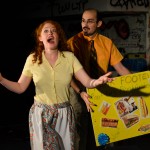Second Stage’s “SMiLETIME” serves up a combo of chaos, fast food, and satire.
My first brush with “SMiLETIME” was in the coldest depths of the Chicago winter. Writer-directors Russell Goldman ’17 and Mitchell Stone ’16 invited me to be among the first to view the initial draft of their surreal play. All I knew was that it took place in a fast food restaurant and featured musical numbers taken from Brian Wilson’s album, Brian Wilson Presents SMiLE. Now, more than a month later, the album’s tracks hauntingly echo across the walls of WestCo Café.
“It blew my mind,” Stone said of SMiLE months later. “I was used to [The Beach Boys] making music that didn’t terrify me. And that stuck with me.
“Auntie Stein’s SMiLETIME Pizzaburger Palace” is centered on the album that effectively ended The Beach Boys. The titular Palace, a non-chain fast food establishment in central Ohio, plays the album’s music nonstop as Auntie and her employees cook their delicious pizza-burgers. The majority of the show takes place after Auntie Stein has unexpectedly vanished, and the Palace’s remaining employees struggle to carry on her legacy. What was once delicious has now become grotesque and inexplicably cold. Beyond that, “SMiLETIME” is not an easy show to describe.
“I think you can describe it as ‘Frankenstein,’ ‘The Office,’ ‘Goodburger,’ ‘Godspell,’” Goldman said. “And I don’t think you’d be wrong with any of those four.”
Stone offered a different perspective.
“I mean the whole thing is supposed to be kind of taking down American culture,” Stone said. “We have the archetypes of modern American heroes, kind of. We have the stoner [Max Cembalest ’18], the guy who thinks he’s better than his job [Zacko Brint ’16]; We’ve got the guy who’s inept at his job [Michael Matthews ’15]; we’ve got the person who thinks everyone else is false, but she’s also the problem and doesn’t realize it [Jessica Wolinsky ’17].”
The show has grown a great deal since that first draft. Perhaps the production’s greatest strength is its use of the eclectic energy of its cast. Emily Feher ’17 rolls her eyes while Matthews attempts in vain to save the dying establishment. Cembalest giggles to himself, whereas Brint screams and throw objects across the room. Jacob Feder ’15, doubling as the music director, provides the show’s closest thing to solace as he plays a gleeful (yet almost disturbing) caricature of himself. Auntie Stein, played by Zoë Thrasher ’16, is captivating in her insanity. Her consistently wide eyes deliver some of the loudest laughs during the first act, especially as she ominously closes a door. Super chef Guy Fieri (as played by Josh Weiner ’18) also makes an appearance.
However, the most pivotal, memorable, and horrific member of the cast is Adam DeSantes ’18. Wolinsky described his character as “delicious,” Goldman described him as “an undercooked prophet,” and Stone. “an unpleasant reality.”
The show lures its audience in with its strangeness. What begins as a seemingly prolonged and surreal sketch somehow becomes a bizarre commentary on zealotry. While some of the musical sequences are less successful than others, they all add to the greasy, unsettling tone that permeates the show. “Good Vibrations” has never been more unnerving. The sickly green set, the cast’s mustard uniforms, and the ethereal lighting only add to that overall effect.
“SMiLETIME” (or its alternate title, “A Modern Parable for Troubled Times”) is a comedy that comments on the sins of humanity while its characters munch on breadstick fries. Characters’ flaws feed into each others’ to create a fantastic mess. They each doom the very establishment they wish to save. The show’s ultimate message is not entirely clear, but perhaps it doesn’t have to be; “SMiLETIME,” much like most of its cast, is perfectly happy to point out problems but not necessarily to solve them.
Or, perhaps more than anything, this is a show about meat. Meat, the bridge between life and death. Meat, the precious substance that has been corrupted by consumerism. Place it on a grill, and watch as it loses its warmth. Eat it, and feel it destroy your insides. Meat is madness; meat is all there is.
Goldman reflected on one of his biggest takeaways of the show’s artistic process.
“I think the fact that we could get 800 dollars—we ended up spending less money, but we could get approved for 800 dollars—to do a show, whatever kind of show we wanted, and have the ability and have the talent, design-wise and acting-wise, to realize a vision that is really unlike anything I’ve seen…. The fact that there’s not even something else creative you have to go through and just have at it,” Goldman said.
“SMiLETIME” generates many reactions, but whatever the show may be, it contains some of the most memorable moments Second Stage has to offer. It is up in the WestCo Café on Feb. 26-28 at 8 p.m. The meat is ready; are you?
- Lianne Yun, Assistant Photo Editor
- Lianne Yun, Assistant Photo Editor
- Lianne Yun, Assistant Photo Editor
- Lianne Yun, Assistant Photo Editor
- Lianne Yun, Assistant Photo Editor





